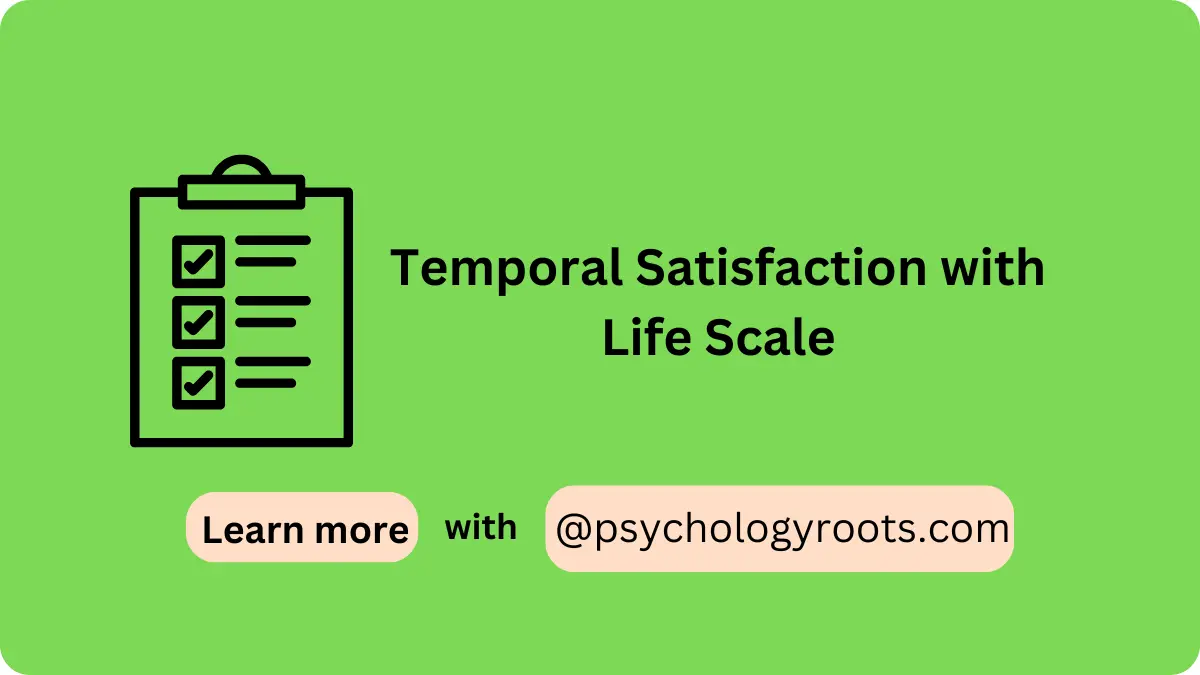Table of Contents
Temporal Satisfaction with Life Scale
Here in this post, we are sharing the “Temporal Satisfaction with Life Scale”. You can read psychometric and Author information. We have thousands of Scales and questionnaires in our collection (See Scales and Questionnaires). You can demand us any scale and questionnaires related to psychology through our community, and we will provide you with a short time. Keep visiting Psychology Roots.
About Temporal Satisfaction with Life Scale
Scale Name
Temporal Satisfaction with Life Scale
Author Details
William Pavot, Ed Diener, and Eunkook Suh (1998)
Translation Availability
English

Background/Description
The Temporal Satisfaction with Life Scale (TSWLS), developed by William Pavot, Ed Diener, and Eunkook Suh in 1998, is a self-report questionnaire designed to assess the cognitive component of subjective well-being by measuring past, present, and future life satisfaction. Distinct from the more well-known Satisfaction with Life Scale (Diener et al., 1985), it provides an integrated judgment of how a person’s life as a whole has gone, is going, and will go. Targeting adults, it is particularly useful for assessing affective forecasting ability, as highlighted in Daniel Gilbert’s work on predicting future emotional states (Gilbert, 2006). Cited in Pavot et al. (1998), it aligns with subjective well-being frameworks (Diener, 1984), focusing on cognitive evaluations of life across temporal dimensions.
The TSWLS comprises 15 items divided into three subscales: Past Life Satisfaction (5 items, e.g., “I am satisfied with my life in the past”), Present Life Satisfaction (5 items, e.g., “I am satisfied with my current life”), and Future Life Satisfaction (5 items, e.g., “I will be satisfied with my life in the future”). Items are rated on a 7-point Likert scale (1 = “strongly disagree” to 7 = “strongly agree”). Scores are summed for each subscale (range: 5-35 per subscale), with higher scores indicating greater satisfaction. Validated in adult samples, it is used to assess life satisfaction trends, evaluate affective forecasting, and inform interventions for well-being.
Psychologists, well-being researchers, and clinicians use the TSWLS to evaluate temporal perspectives on life satisfaction, study cognitive biases in forecasting, and design interventions to enhance subjective well-being. Its temporal structure and strong psychometric properties are strengths, though English-only availability may limit cross-cultural use.
Administration, Scoring and Interpretation
- Obtain a copy of the scale from authorized sources, such as Pavot et al. (1998) in Journal of Personality Assessment (Vol. 70, pp. 340-354), ensuring ethical use permissions.
- Explain the purpose to respondents, noting that it assesses satisfaction with life across past, present, and future to support well-being, emphasizing anonymity and using clear, non-judgmental language.
- Provide instructions, asking respondents to rate their agreement with statements about life satisfaction across three timeframes, using the 7-point scale, based on their overall life perspective.
- Approximate time for completion is 3-5 minutes, given the 15-item format.
- Administer in clinical, educational, or research settings, using paper or digital formats, ensuring a private environment. Oral administration may be used for accessibility.
Reliability and Validity
The TSWLS demonstrates strong psychometric properties, as reported in Pavot et al. (1998). Internal consistency is good, with Cronbach’s alpha ranging from 0.83 to 0.91 for the Past, Present, and Future subscales. Test-retest reliability is moderate to high (r ≈ 0.70-0.85 over weeks), reflecting stability in life satisfaction judgments.
Convergent validity is supported by correlations with related constructs, such as the Satisfaction with Life Scale (r ≈ 0.60-0.80 for Present subscale) and positive affect measures (r ≈ 0.40-0.60). Discriminant validity is evidenced by weaker correlations with unrelated constructs, like cognitive performance (r < 0.30). Criterion validity is demonstrated by its ability to predict well-being outcomes and affective forecasting accuracy in longitudinal studies. Construct validity is supported by its three-factor structure (Past, Present, Future), confirmed through factor analyses. Its robust psychometric profile makes it reliable, though pairing with affective measures like the Happiness Measures (Fordyce, 1988) can enhance comprehensive assessment.
Available Versions
15-Items
Reference
Pavot, W., Diener, E., & Suh, E. (1998). The temporal satisfaction with life scale. Journal of personality Assessment, 70(2), 340-354.
Important Link
Scale File:
Frequently Asked Questions
What does the Temporal Satisfaction with Life Scale measure?
It measures past, present, and future life satisfaction.
Who can use the scale?
Psychologists, well-being researchers, and clinicians studying adults.
How long does the scale take to complete?
It takes about 3-5 minutes.
Is the scale specific to certain groups?
It targets adults, with broad applicability across populations.
Can the scale inform interventions?
Yes, its strong reliability and validity support well-being and forecasting interventions.
Disclaimer
Please note that Psychology Roots does not have the right to grant permission for the use of any psychological scales or assessments listed on its website. To use any scale or assessment, you must obtain permission directly from the author or translator of the tool. Psychology Roots provides information about various tools and their administration procedures, but it is your responsibility to obtain proper permissions before using any scale or assessment. If you need further information about an author’s contact details, please submit a query to the Psychology Roots team.
Help Us Improve This Article
Have you discovered an inaccuracy? We put out great effort to give accurate and scientifically trustworthy information to our readers. Please notify us if you discover any typographical or grammatical errors.
Make a comment. We acknowledge and appreciate your efforts.
Share With Us
If you have any scale or any material related to psychology kindly share it with us at psychologyroots@gmail.com. We help others on behalf of you.